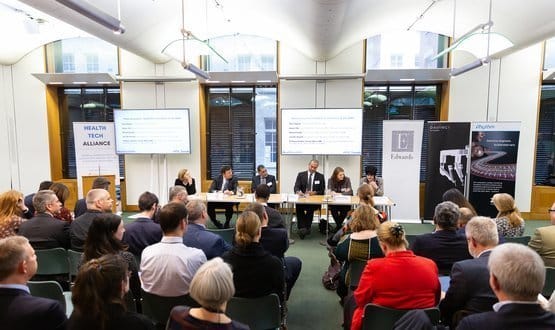Driving innovation a key theme at Parliament and Health Tech conference
- 29 January 2020

The importance of innovation and moving health technology forward in the NHS was discussed at a Parliament and Health Technology conference this week.
Representatives from technology companies, NHS organisations and accelerators heard from two expert panels about the future of health technology at the event in Westminster on 28 January.
Panel discussions were followed by a keynote speech from health secretary Matt Hancock, during which he announced a £140 million artificial intelligence (AI) award to encourage AI innovation within the health service.
The event, hosted by the Health Tech Alliance also focused on the work of the Accelerated Access Collaborative (AAC) and the building blocks that need to be in place in order for innovation in the NHS to be successful.
NHS Providers chief executive Chris Hopson told the audience the NHS needs to be “brave and bold” when it comes to adopting new technology, forgetting the “scars on their backs” from previous programmes.
“We’ve spent a lot of time over the last year as senior leadership developing the people plan, do we need a similar digital plan that sets out clearly where services need to go on digital, with innovation being a key part of that,” he added.
Professor Tim Orchard, chief executive of Imperial College Healthcare NHS Trust, praised the work of the AAC and other organisations aiming to centralise processes for innovation.
“If you are a clinician or innovator it (the NHS) is a very complex environment to navigate so I think that any form of centrification will be incredible helpful,” he said.
“I think the more providers and patients are involved in driving policy and also the subject areas we will end up with really needs-based technologies.”
He also spoke of the pressures facing the NHS workforce, including understaffing, and the need to prepare them for a digital future.
“When I trained as a doctor there was a very old fashion approach to science where of course now people need to be complete OK with how we use big data, what’s the impact of AI going to be on how we provide healthcare, there’s a completely different set of issues,” Orchard added.
“There is something very important about upskilling our clinical workforce in order to be able to engage in these issues.”
‘We need game-changers’
Professor Heather Tierney-Moore, NHS Supply Chain board member and ex-chief executive of Lancashire Care NHS Foundation, spoke of how innovation needs to drive forward change in the NHS.
“We are fundamentally now looking for game changers. We are no longer looking for gold plated versions of what we’ve already go, we need things that drive us in the NHS to make those better changes in clinical practice and how we deliver care across health and social planning,” she said
“We need some different approaches to how we rapidly test then actively survey, particularly when things are higher risk. I don’t think we’ve quite wrapped our heads around that.
“And recognising that if we are going to innovate then we will get some failures.”




